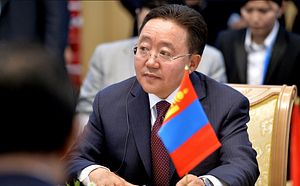“Landlocked” Mongolia may become a problem solver in the Asia-Pacific. Whether its Ulaanbaatar’s small country diplomacy or its non-nuclear weapons state (NNWS) status, both regional and international actors recognize Mongolia’s accountability and transparency in the global political arena. Mongolia’s involvement in international peace missions, multilateral dialogues, and regional peace and security cooperation has marked both the country’s development and the openness of its foreign policy approaches.
In the past six months, the world has seen repeated evidence that the North Korean nuclear issue has turned into a prolonged crisis. Numerous agreements, economic sanctions, and unilateral approaches have had no effect. Those in the West may not feel the immediacy of the threat, but in the Asia-Pacific it is a ticking bomb. North Korea’s repetitive “rogue” acts not only threaten regional peace and security but also jeopardize both political and economic solutions to overcome its protracted desolation. While neighboring countries, China, Japan, and South Korea are seeking deterrence, Mongolia may become an integral part of stabilizing the Korean Peninsula with its small country diplomacy.
One way to look at North Korea’s nuclear crisis is to separate nuclear weapons state (NWS) from non-nuclear weapons states (NNWS). In this regard, North Korea’s position highlights the level of threat it perceives from NWS such as the United States, its allies under the “nuclear umbrella” Japan and South Korea, and even China. Mongolia, as a NNWS, is positioned to act as a possible peacemaker, like Norway. Indeed, information from WikiLeaks suggests it has already served as a go-between, conveying messages from North Korea to the United States.
Mongolia-North Korea relations date back to the Korean War of 1950-1953 and continue to this day. Mongolia’s earliest diplomatic engagement with North Korea dates back to 1988, when two countries signed a Legal Assistance Agreement for the development of civil society and criminal justice legal framework. After Mongolia’s peaceful democratic revolution in 1990, Mongolia and North Korea’s political systems diverged. Mongolia’s peaceful democratic transition could have been a perfect model for Pyongyang’s own political transition.
While the Mongolian government condemns North Korea’s dangerous moves, Ulaanbaatar continues to believe in peace negotiations, seeking stable diplomatic and economic solutions to overcome political, economic, and civil issues on the Korean peninsula.
Since the Korean War, Mongolian foreign policy has believed in the peaceful unification of Korea; thus Ulaanbaatar kept diplomatic dialogues open for both South and North Korea. In 2015, Mongolia and South Korea has celebrated the 25th anniversary of diplomatic relations and integrated civil and economic ties. While keeping good relations with South Korea, Mongolia continues to push for international talks with North Korea.
As of Mongolian foreign policy objectives moved beyond the good neighbor policy toward Russia and China, North Korea was to become one of its development routes via economic ties. As Mongolia strives to diversify its economy through its “third neighbor policy,” this very agreement could turn into a diplomatic bridge to unlock North Korea. In 2009, Mongolia’s Ministry of Road and Transportation signed a transit agreement with the North Korean authorities to utilize the Rajin Port for export purposes. The agreement would allow Mongolia to ship 25,000 tons of coal to North Korea. By the same token, the transit agreement highlights the fact North Korea is willing to open up at some level with a NNWS, non-threatening country such as Mongolia.
From a security standpoint, Mongolia’s position in the Asia-Pacific is to push for renewed Six Party Talks over North Korea’s nuclear program. Since early 2013, Mongolia’s Foreign Ministry has been active in its support for a peaceful solution and has been recognized as a possible mediator to the international community.
In June 2014, Mongolia hosted the “Ulaanbaatar Dialogue on Northeast Asian Security,” an international Track 1.5 conference to promote stability, peace, and security, as well as economic cooperation with North Korea. The gathering of 35 representatives (including those from Mongolia, Russia, China, Japan, North Korea, South Korea, the United States, Germany, and the Netherlands) at this dialogue illustrated the importance of the international coalition and its dedication to solving the prolonged nuclear issue. On the home front, the hosting of such an important conference highlights the accountability and transparency of Mongolia’s status in the international political arena.
In August 2015, during a meeting with North Korean deputies, Mongolian parliamentary members expressed their hope for peaceful negotiations and further cooperation in multiple sectors.
Ulaanbaatar has put itself in a significant position to mediate future negotiations to stabilize the Korean Peninsula. The great conqueror Genghis Khan once said: “Those without far-sighted goals suffer from constant obstacles.” The Mongolian government continues to believe in the peace and security of the Asia-Pacific and is using its small country diplomacy to pursue the ultimate breakthrough with North Korea.
Bolor Lkhaajav is a foreign policy analyst pursuing a Master of Arts in Asia Pacific Studies.

































